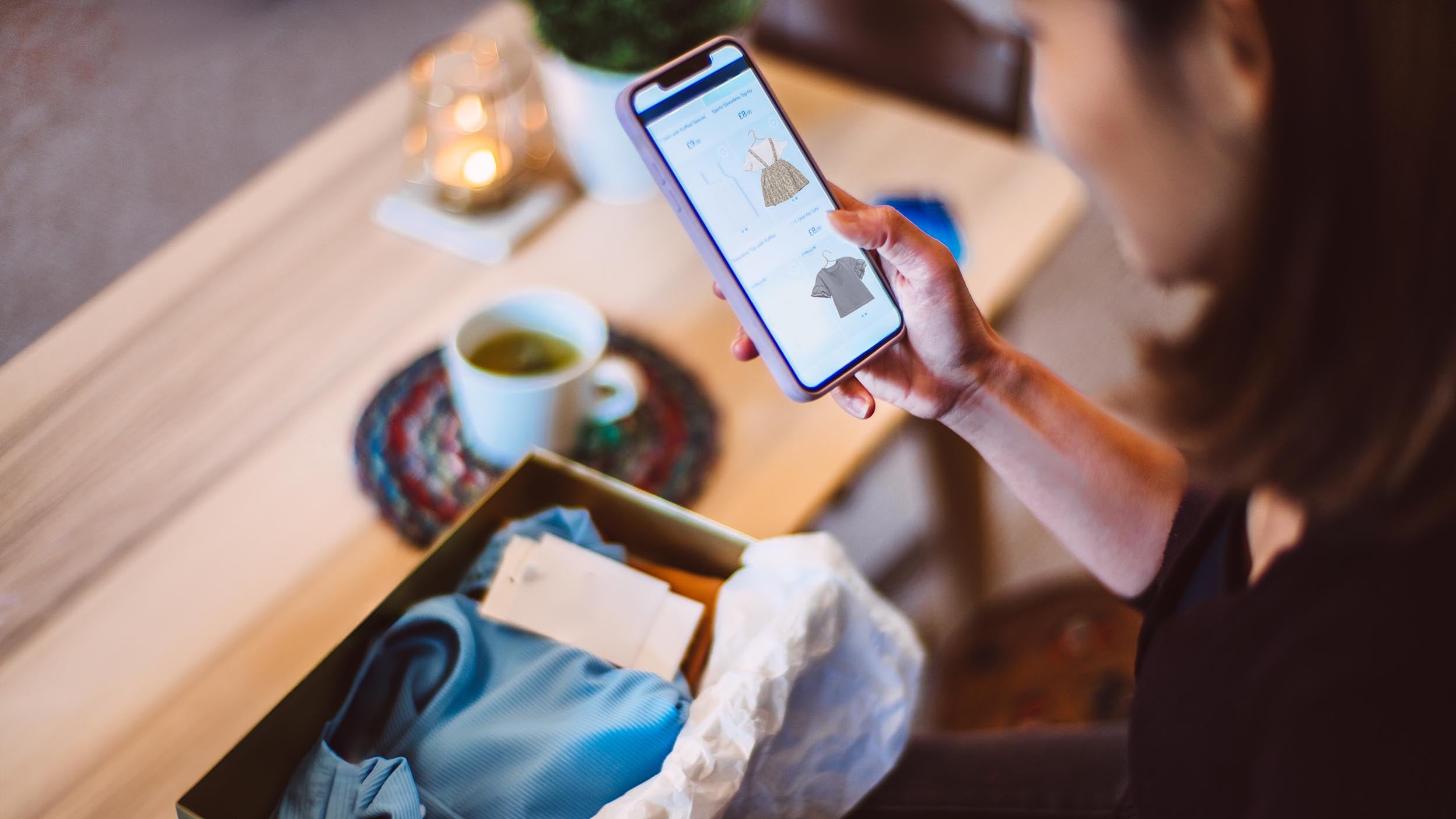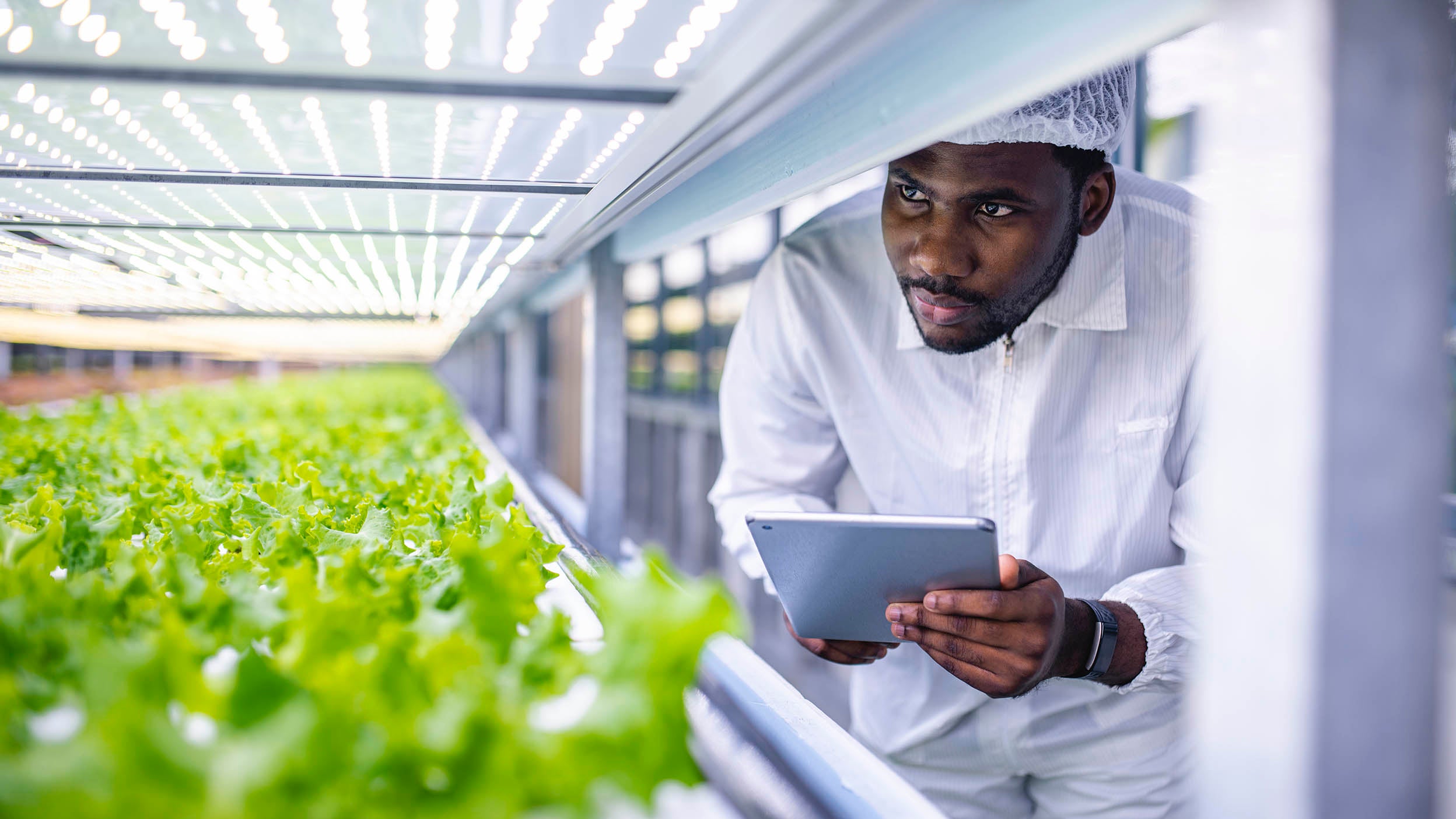
Innovation Unlocking e-commerce potential in a digital world
Learn how e-commerce has changed our global economy and about the holding companies behind this growing trend

Food innovation is now more than just the morsels on your plate – it’s about how it gets there, how it’s made, and how technology transforms every step of the process. From smarter delivery systems to sustainable packaging and lab-grown alternatives, companies in the Nasdaq-100 Index are redefining the food industry.
Amazon, one of the largest holdings in Invesco QQQ, is changing the way consumers shop for food. After acquiring Whole Foods Market in 2017, Amazon introduced Amazon Fresh and Amazon Pantry, expanding grocery delivery across the U.S. Its Amazon Go stores use Just Walk Out technology, powered by sensors and artificial intelligence, to create a cashier-less shopping experience. These innovations make grocery shopping faster and more efficient, while also transforming the retail food landscape.
PepsiCo has gone far beyond soda, focusing on sustainability and healthier products. The company’s Pep+ (PepsiCo Positive) initiative highlights its commitment to regenerative agriculture and environmentally friendly food production. Brands like Lay’s Oven Baked and Gatorade reflect PepsiCo’s ability to balance taste and health while adapting to changing consumer demands.
Keurig Dr Pepper is reimagining how people enjoy beverages at home and on the go. Its Keurig single-serve coffee systems offer unmatched convenience, variety, and sustainability with recyclable pods. The Drinkworks Home Bar takes innovation a step further, letting consumers craft cocktails with the push of a button. By focusing on packaging sustainability and sourcing, Keurig Dr Pepper is leading the charge in beverage innovation for modern lifestyles
Starbucks combines product innovation with technology to enhance the customer experience. The Starbucks Rewards app, with more than 34 million active users,1 leverages digital tools to drive loyalty and streamline orders. Sustainability remains a key focus, with plant-based menu items and initiatives to reduce single-use plastics. New offerings like Nitro Cold Brew and ready-to-drink beverages showcase Starbucks’ ability to adapt to evolving consumer tastes while maintaining its global appeal. QQQ, which tracks the Nasdaq-100 Index, provides exposure beyond the tech sector and includes well-known consumer discretionary brands like Starbucks.
DoorDash has revolutionized how food reaches consumers, making delivery faster and more accessible. The global online food delivery market stood at $232.76 billion in 2024 and is projected to rise to $637.46 billion by 2034, a compound annual growth rate (CAGR) of 10.6%, according to Precedence Research.2
Source: Precedence Research, “Online Food Delivery Market Size, Share, and Trends 2024 to 2034,” September 2024
Door Dash’s DashPass subscription provides affordable delivery options, while the company’s expansion into grocery and convenience store deliveries shows its adaptability. Innovations like “ghost kitchens” optimize restaurant logistics, helping meals get to tables quickly and efficiently. DoorDash’s tech-driven solutions are redefining convenience for modern consumers
From grocery delivery to sustainable beverages and digital-first dining, Nasdaq-listed companies are helping shape the future of food. Whether it’s making delivery faster, reducing environmental impact, or creating healthier products, these advancements are changing how we eat, shop, and experience food.
Explore how innovation can help drive growth at Invesco QQQ’s Recipe for Innovation, where technology and food meet, and the next generation of chefs and culinary leaders set the table for what’s next.
Starbucks Q1 fiscal 2024 results, January 2024.
Precedence Research, “Online Food Delivery Market Size, Share, and Trends 2024 to 2034,” September 2024.
Select the option that best describes you, or view the QQQ Product Details to take a deeper dive.

Learn how e-commerce has changed our global economy and about the holding companies behind this growing trend

Technology has disrupted just about everything. Learn how innovation is driving something as simple as your favorite cup of coffee.

Digital assets, such as blockchain and cryptocurrency, are becoming a major industry. In this guide, we provide investors insight into the asset class.
NA4160335
Past performance is not a guarantee of future results.
This does not constitute a recommendation of any investment strategy or product for a particular investor. Investors should consult a financial professional/financial consultant before making any investment decisions.
The opinions expressed are those of the author, are based on current market conditions and are subject to change without notice. These opinions may differ from those of other Invesco investment professionals.
Forward-looking statements are not guarantees of future results. They involve risks, uncertainties and assumptions; there can be no assurance that actual results will not differ materially from expectations.
This information is provided for informational purposes and does not constitute an endorsement or recommendation of any companies referenced.
Compound annual growth rate (CAGR) is the mean annual growth rate of an investment over a period longer than one year.
This content should not be construed as an endorsement for or recommendation to invest in Amazon, PepsiCo, Keurig Dr Pepper, Starbucks, or DoorDash. Neither Amazon, PepsiCo, Keurig Dr Pepper, Starbucks, nor DoorDash are affiliated with Invesco. Only 5 of 101 underlying Invesco QQQ ETF fund holdings are featured. The companies referenced are meant to help illustrate representative innovative themes, not serve as a recommendation of individual securities. Holdings are subject to change and are not buy/sell recommendations. See invesco.com/qqq for current holdings. As of 1/14/2025, Amazon, PepsiCo, Keurig Dr Pepper, Starbucks, and DoorDash made up 5.99%, 1.28%, 0.27%, 0.68%, and 0.42%, respectively, of Invesco QQQ ETF.